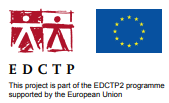
Leveraging capacity for early phase clinical trials for filoviruses in Uganda (CAPA-CT2 Project)
ACRONYM: CAPA-CT 2
PI/Fellow: Dr. Mohammed Lamorde
The CAPA-CT 2 project aims to generate knowledge relevant to the potential spread of the EVD outbreak in Democratic Republic of the Congo (DRC) to the Republic of Uganda. First, the project intends to improve knowledge of the mechanism of action of a prioritised drug by generating local clinical pharmacokinetic data that is needed for interpretation of pharmacokinetic data generated through MEURI, drug interactions with antiretroviral drugs and to inform future treatment optimisation approaches. Second, the project seeks to use diagnostic approaches to strengthen surveillance for especially dangerous pathogens in Uganda. Third, the project will describe a capacity building model for rapid acquisition of competencies for enhanced laboratory biosafety and infection prevention and control for case management using a low-cost mentorship strategy, while contributing to the national response. The costs and effectiveness of this strategy will be evaluated. A communications/social science work package will be implemented in support of activities across the work packages. The project leverages prior and ongoing investments by the idimake_edctp (CAPA-CT, VirTUAL and TMA2015-1166) for a clinical pharmacokinetic study and an ongoing project in collaboration with investigators at Johns Hopkins University for a surveillance research project. CAPA-CT 2 is aligned to national priorities and ongoing capacity building and research Global Health Security Agenda investments in Uganda. The CAPA-CT 2 project consortium comprises the following institutions: Infectious Diseases Institute, Makerere University Uganda, University of Liverpool, United Kingdom and University of Turin, Italy.
Keywords: Ebola, Sub-Saharan Africa, Surveillance, Capacity Building
Proposed start date: 1 Feb 2019
Proposed duration: 18 MONTHS
Requested idimake_edctp contribution (in Euros): 500,000 EUROS


